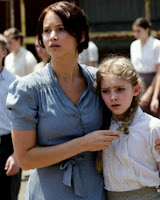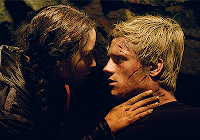"“But Mockingjays were never a weapon," said Madge. "They’re just songbirds. Right?"
"Yeah, I guess so,” I said, but it’s not true. A mockingbird is just a songbird. A mockingjay is a creature the Capitol never intended to exist. They hadn’t counted on the highly controlled jabberjay having the brains to adapt to the wild, to thrive in a new form. They hadn’t anticipated its will to live.”
Katniss Everdeen inadvertently becomes the spark that sets the world ablaze in the follow up to Suzanne Collins' best-selling book:The Hunger Games. I personally feel these books have been mis-marketed as they are found only in the young adult sections of book shops and are perhaps as a consequence less appealing or obtainable to the adult readership. I write about these books because I consider them, along with many other people I'm sure, to have intrinsic literary value above and beyond the selling strategies and market categorisation. I feel convinced that they will become classics, ones that are ever relevant in a similar way to dystopian 'fictions' like Nineteen Eighty-Four, Animal Farm, Brave New World and more modern ones such as Cormac McCarthy's The Road, which I would argue overlaps with many aspects of The Hunger Games.
I made many of these points previously in my review of the first book/movie so I mainly want to focus on Catching Fire as a text in its own right. If anything the writing is superior in this novel as Collins truly masters extreme insight, suspense and harrowing descriptions. There is no denying the horror of it all but it is done in a way that is deeply affecting and thought provoking, from the attacks on Cinna and Gale to the goings on in the arena. It's like a million nightmares rolled into one and yet it is so real. It's not embellished or romanticised to any great extent. And then there is the extreme sensitivity in the consideration of different kinds of resistance - the reckless fire and violent passions embodied in Gale and, to some extent, Katniss, juxtaposed with what starts to show itself as equally, if not more, valuable - the good, earnest, pure Peeta and the power of words. Remarked as being the only 'decent' person to win The Hunger Games.
"Certainly he is brave, but we have all been brave enough to survive a Games. There is that quality of goodness that's hard to overlook, but stil... and then I think of it, what Peeta can do so much better than the rest of us. He can use words. He obliterated the rest of the field at both interviews. And maybe it's because of that underlying goodness that he can move a crowd--no, a country--to his side with the turn of a simple sentence. I remember thinking that was the gift the leader of our revolution should have. Has Haymitch convinced the others of this? That Peeta's tongue would have far greater power against the Capitol than any physical strength the rest of us could claim?"
For surely it is words which will unhinge the Capitol because they cannot crush the intangible. They cannot kill or subdue an idea, and this is the phase that Catching Fire marks, the blossoming of an idea, the spur to action - something that cannot be undone or unsaid.
“I can hear President Snow's voice in my head. 'On the seventy-fifth anniversary, as a reminder to the rebels that even the strongest among them cannot overcome the power of the capital, the male and female tributes will be reaped from their existing pool of victors.”
 Katniss experiences the beginnings of the consequences of her act of defiance in the first games as she returns home and must deal with being watched as the Capitol seeks to quieten whisperings of rebellion. She essentially grows into the image of the Mockingjay, a persona which she did not consciously choose but which has fallen upon her shoulders:
Katniss experiences the beginnings of the consequences of her act of defiance in the first games as she returns home and must deal with being watched as the Capitol seeks to quieten whisperings of rebellion. She essentially grows into the image of the Mockingjay, a persona which she did not consciously choose but which has fallen upon her shoulders:
“The bird, the pin, the song, the berries, the watch, the cracker, the dress that burst into flames. I am the mockingjay. The one that survived despite the Capitol's plans. The symbol of the rebellion.”
She is not the born rebel, like Gale, but ordinary - torn between anger and fear - devoid of hope afraid to yearn for it, still desperate to protect the ones she loves. But the odds are not in her favour.
“At some point, you have to stop running and turn around and face whoever wants you dead.The hard thing is finding the courage to do it.”
I think the motif of the Mockingjay is such a powerful image in two ways - firstly, the crucial fact that a mockingjay imitates - it is given words/songs by other people, and secondly, more positiviely: it is the unprecedented creature which surprised the world - which we first encountered as a small good luck charm, and which grew into a symbol - that there are some things the government can't control - but most of all it embodies hope - because for me the Mockingjay is not just Katniss alone, it is her and Peeta - resistance and words - fire and light - reason and hope combined against the odds yet co-dependant - a fire that cannot exist without the hope, a resistance that cannot sustain itself without the words - a girl who needs the light she first saw in the boy with the bread.






